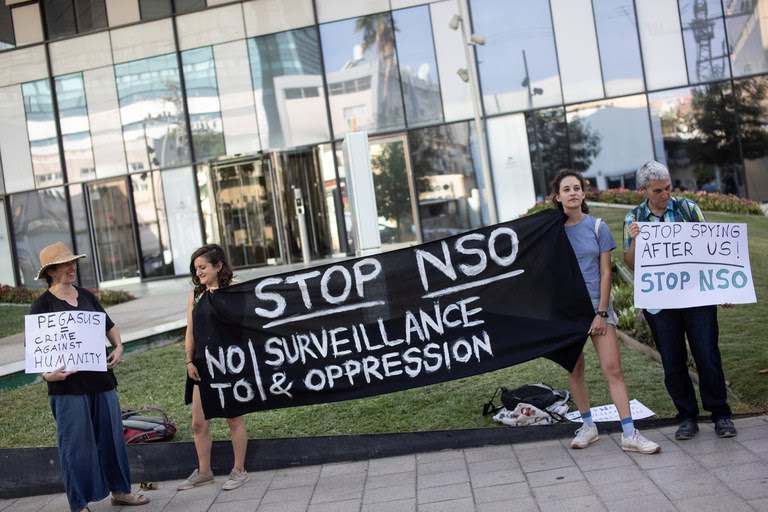
By Nazmul Ahasan on Jan 14, 2023
The Bangladesh government’s latest purchases of advanced surveillance tools from Israel-linked companies, reported by the Israeli newspaper Haaretz, is fueling fresh concerns about privacy and freedom of expression in the South Asian country.
Bangladesh’s acquisition of mass surveillance tools from companies with ties to Israel have previously been reported, but a Haaretz investigation published this week identified four new purchases valued at $12.8 million.
Bangladesh, the world’s third most populous Muslim-majority country, does not recognize Israel, in support of Palestinian statehood, and has an import ban in place against it.
Dhaka has not denied the Haaretz report, except to say the purchases were not “directly” from Israel. Two days after the report came out, Bangladesh’s home minister said his ministry had acquired surveillance technology for “lawful” purposes.
He was responding to a question from an MP with the ruling Awami League who asked if the government would increase vigilance in the face of what he called local and foreign conspiracies.
“The government has taken the initiative to introduce an ‘Integrated Lawful Interception System (ILIS)’ to monitor social media and thwart various anti-state and anti-government activities,” Home Minister Asaduzzaman Khan Kamal told parliament on Thursday.
“Modern technology like Open Source Intelligence Technology (OSINT) has been added in the National Tele-communication Monitoring Centre (NTMC) under the home ministry to thwart anti-state and anti-government activities,” he said.
‘Shopping spree’
Transparency International Bangladesh (TIB) sharply criticized Khan’s comments, arguing that in the absence of any specific policy related to cyber surveillance, the advanced tools would erode fundamental constitutional rights related to privacy, communication, and freedom of expression.
In a media briefing, the TIB cited previous examples of private phone chats and conversations of politicians, businessmen, journalists, and opposition figures being intercepted and leaked on social media to embarrass them.
Bangladesh’s laws do not require intelligence and law enforcement agencies to obtain permission before conducting cyber surveillance operations against individuals.
A researcher based in Norway linked the recent purchases with Bangladesh’s next election, expected in December 2023 or January 2024.
“As the election approaches, this shopping spree of sophisticated spyware shows how desperate state agents are to snoop into opposition activists and their strategies,” Mubashar Hasan, a Bangladeshi scholar at the University of Oslo, told BenarNews.
“Despotic governments use spyware worldwide to crush their respective opposition. And there is no proof that the Bangladesh government will act differently.”
The recent purchases reportedly include “a spy van” said to be capable of intercepting sensitive data, including encrypted messages from WhatsApp, within a specific radius.
Asked about the product, Bruce Schneier, a computer security expert at Harvard University, told BenarNews that vulnerabilities lie more with users’ devices than with the encrypted messaging apps.
“WhatsApp and Signal are – as far as we know – secure,” he said. “But your phone is not. So if I hack your phone and read your screen, I can read your WhatsApp and Signal messages even though I haven’t hacked either messaging program.”
BenarNews previously reported on the Bangladesh government’s decision to purchase the mobile receptor tool from a Swiss company, which the Haaretz investigation found was acting as a middleman for a Cyprus-based Israeli provider.

Appetite for Israeli technology
Israel, a country of 10 million, has one of the most lucrative private surveillance industries in the world.
NSO Group, a cyber security firm based in Israel, recently attracted the global spotlight after revelations about its notoriously powerful spyware being used by countries with dismal rights records.
Despite the bad press, such companies continue to attract customers.
“The latest revelations about Israel selling surveillance weapons to Bangladesh follow a sadly familiar pattern. The fact that Bangladesh is a dictatorship is irrelevant for Israeli arms dealers and the Jewish state,” said Antony Loewenstein, an Australian researcher whose forthcoming book deals with Israel’s export of surveillance technology.
In Feb. 2021, Al Jazeera reported that Bangladesh had purchased surveillance equipment manufactured by an Israeli firm that listed Hungary as its country of origin. Al Jazeera alleged that Bangladeshi officers were trained by Israeli experts to use the equipment that can monitor hundreds of mobile phones at one time.
The Defense Ministry in Israel, which regulates the industry, did not answer to Haaretz whether it had granted defense export permission for the Bangladesh sales.
“Israeli arms are routinely used as diplomatic weapons. There are barely any credible checks and balances in Israel,” Loewenstein said.
In May last year, Bangladesh dropped an “except Israel” clause from passports, which was welcome by Israeli officials.
However, Bangladesh still insists its policy toward Israel has not changed. Political sensitivity around Israel hasn’t waned, either.
Over the last weeks, ruling party leaders and activists have accused Nurul Haq Nur, a prominent student activist, of meeting an Israeli civil society leader, Mendi N. Safadi, in the United Arab Emirates. Nur has denied any such meeting.
Ruling party officials claim Safadi was an agent of Mossad, the Israeli external spy agency, and was plotting with Nur to orchestrate regime change in Bangladesh.
In May 2016, Aslam Chowdhury, a leader of the opposition Bangladesh Nationalist Party (BNP), was jailed for an “anti-state plot” after meeting Safadi at an event in India.
A month later, senior officials claimed that attacks occurring at that time in Bangladesh were the result of a conspiracy between Mossad and the BNP – a claim rejected by Israel as “utter drivel.”
Recently, Bangladesh’s Supreme Court canceled the bail earlier granted by a lower court to Chowdhury in the 2016 case.
